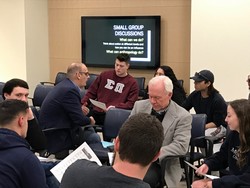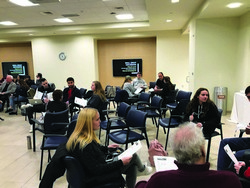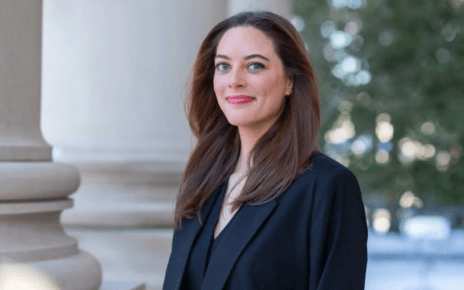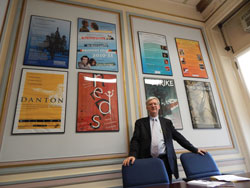Monmouth University’s Department of History and Anthropology invited students and faculty to discuss their concerns regarding climate change in observance of National Anthropology Day on Wednesday, Feb. 19.
Heidi Bludau, Ph.D., Lecturer of Applied Anthropology, hosted the school’s second annual themed event, on behalf of Monmouth’s History and Anthropology Department and the American Anthropological Association. During the event attendees were asked for their insights on climate change.
Often perceived to be one of the most imminent threats to humanity, climate change consistently ranks among the issues concerning college students the most. For the 2017 World Economic Forum Global Shapers Survey, responses were recorded from over 31,000 people aged 18-35 in 186 countries; of these, 48.8 percent listed “climate change” or “environmental destruction” as the most serious issue impacting the world.
The discussion, which took place in Edison Science Hall, began with an interactive poll which asked faculty and students: “What worries you the most about climate change?” By answering via their devices, attendees were able to anonymously add their responses to a word cloud projected at the front of the room, which would grow in correspondence with the frequency of key terms. Among the dominant concerns included “biodiversity,” “sustainability,” “ethics,” and “extinction.”
 Bludau then presented a short slide show breaking down the components of climate change. “Global warming is just one part of climate change,” she said. “There are natural causes, like disasters and other organisms,” she explained, “but much of climate change is anthropogenic— caused by human activity. That’s how this all relates to anthropology, and why climate change is becoming an important part of the field.” The interactive presentation also noted effects of climate change over time, including extreme weather and increases in physical injuries, animal-borne diseases, and undrinkable water. One attendee noted that sea levels are projected to rise up to six feet by 2100.
Bludau then presented a short slide show breaking down the components of climate change. “Global warming is just one part of climate change,” she said. “There are natural causes, like disasters and other organisms,” she explained, “but much of climate change is anthropogenic— caused by human activity. That’s how this all relates to anthropology, and why climate change is becoming an important part of the field.” The interactive presentation also noted effects of climate change over time, including extreme weather and increases in physical injuries, animal-borne diseases, and undrinkable water. One attendee noted that sea levels are projected to rise up to six feet by 2100.
The dozens of students and faculty attending the event then gathered into small groups to discuss the core issues of climate change and personal opinions. Additionally, the groups were supplied with a list of questions to serve as jumping-off points. The groups shared their personal extreme weather experiences, with multiple stories focusing on Hurricane Sandy, a large cyclone which caused severe damage to New Jersey and the rest of the mid-Atlantic in 2012.
Groups also discussed the topic of what governments can do and have been doing to combat climate change. Tony MacDonald, Director of Monmouth University’s Urban Coast Institute, said, “The United States is now the world’s largest producer of oil and gas; however, we’ve recently taken steps in the wrong direction when it comes to reducing our emissions,” referring in part to the American withdrawal from the Paris Agreement to shrink each country’s individual carbon footprint.
“Governor Phil Murphy has taken multiple steps toward renewable energy in our state,” MacDonald said regarding New Jersey’s efforts to combat climate change. “New Jersey has begun implementing an aggressive offshore wind farm program.”
Students had their chance to explain their stances on climate change in the smaller groups as well. Trinity Caratenuto, a freshman majoring in marine and environmental biology and policy, said, “Climate change affects us in all ways, even ways we don’t notice in our everyday lives.” She also shared her idea for increasing public understanding of climate change. “I think there should be classes on the subject taught in schools, so the general public are all basically aware of it. Everyone should care.”
However, not everyone believes that climate change is an imminent danger. “Since it hasn’t really been affecting me, I rarely pay much attention to it,” said Jake Collins, a senior accounting student. Jake is not alone in his take on climate change; in the 2019 Yale Climate Opinion Maps, an estimated 40 percent of Americans are “not worried” about global warming.
The smaller groups then reconvened for the conclusion of the event, during which the main ideas of the small group discussions were summarized. Many of the ideas matched up with ideas making up the word cloud presented earlier in the evening like renewable energy, rising sea levels, extinction, and volatile weather patterns.
The final topic of the event had to do with individual contributions to be made in the fight against climate change. Bludau quoted anthropologist Margaret Mead in order to put the individual small contributions into perspective: “Never doubt that a small group of thoughtful, committed citizens can change the world; indeed, it’s the only thing that ever has.”
“Climate change really is an issue that at its core has to do with humans,” explained Bludau. “A small group can change our future for the better, but those same people also have the power to affect it negatively, so we have to be responsible.”
The Department of History and Anthropology is one of Monmouth University’s “largest and most vibrant departments,” according to the History and Anthropology department page. “We offer eleven different majors including, of course, history and anthropology as well as dual majors with education, special education, and an interdisciplinary major with political science.”
“We are also particularly proud of our students,” the informational page states, as “… many of them have gone on to careers in teaching, law, museum studies, cultural resource management, forensics, government service, law enforcement, and many other fields. Others have pursued further graduate level education.”
PHOTOS TAKEN by Alex Dyer




